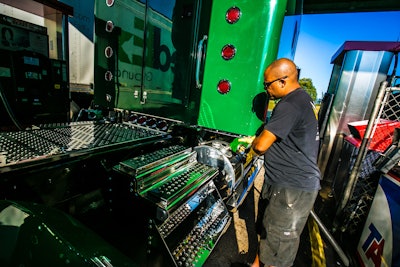
For as much controversy that swirls around the The Trump Administration's "Big Beautiful Bill" and its potential to send the national debt soaring, the proposed legislation could be a good thing for greener trucking, according to several industry trade groups.
The Senate's proposed tax and budget reconciliation legislation modifies the 45Z Clean Fuel Production Tax Credit and restores tax parity between sustainable aviation fuel (SAF) and other advanced biofuels like biodiesel and renewable diesel effective Oct. 1, 2025. U.S. biofuel production has dropped sharply since the credit took effect in January.
Research conducted by American Transportation Research Institute (ATRI) shows renewable diesel is not only a promising solution for lowering the trucking industry’s CO2 emissions, it's also significantly cheaper than battery electric technology. RD consumption levels in 2023 reached 2.868 billion gallons annually in the U.S., according to ATRI – a nearly 67% increase from 2022. In 2022 CARB reported that 73% of RD consumed in the U.S. was sold in California and received credits through its Low Carbon Fuel Standard (LCFS) regulatory program.
"We give the Senate a lot of credit for reconfiguring '45Z' to be truly technology neutral. SAF should be incentivized at the same rate as all other biofuels. An equal incentive – 'parity' – will result in more gallons of biofuel being produced and consumed, all at a lower cost for taxpayers," said David Fialkov, Executive Vice President of Government Affairs for NATSO, representing truck stops and travel centers, and SIGMA, a group of America's Leading Fuel Marketers. "Importantly, this provision reduces the overall cost of the '45Z' tax credit while also incentivizing more over the road fuel production – helping to lower prices for consumers. A win for everyone."
The Inflation Reduction Act of 2022 provided a higher tax credit of up to $1.75 for Sustainable Aviation Fuel production. The higher aviation fuel tax credit signed into law by President Biden, coupled with the expiration of the Biodiesel Blenders' Tax Credit at the end of 2024, has decimated America's advanced biofuel supply chains.
"A level playing field for sustainable aviation fuels versus over-the-road biofuels is critical to restoring the biodiesel market," said Matt Durand, National Association of Convenience Stores Deputy General Counsel. "Today, the biodiesel market is failing due to tax policy. Unless we act to ensure biodiesel is no longer disadvantaged, the market may never recover."











